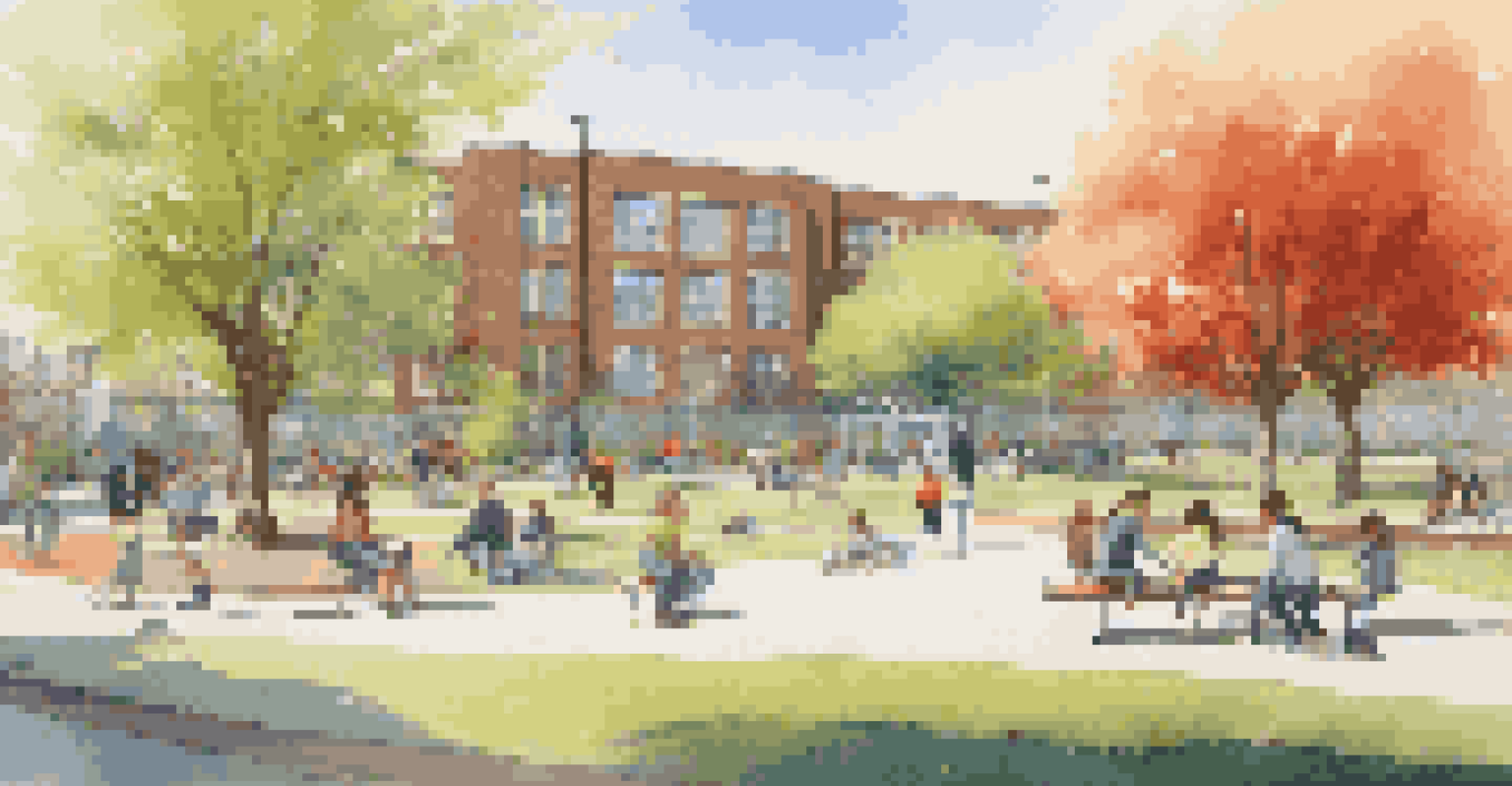The Importance of Neighborhood Character in Investment Choices

Defining Neighborhood Character and Its Elements
Neighborhood character refers to the unique traits that define a community, including architecture, cultural atmosphere, and local amenities. These elements collectively create a sense of place that can significantly impact property values and investment potential. Understanding these characteristics is crucial for investors looking to make informed decisions that align with their financial goals.
The best investment on Earth is earth.
For instance, a neighborhood with historic buildings and vibrant street art may attract a different demographic compared to a suburban area with modern developments. This diversity in character can lead to varying investment prospects, making it essential to analyze each neighborhood's unique attributes. Therefore, defining neighborhood character is the first step in evaluating its investment viability.
Ultimately, neighborhood character shapes not only how a community feels but also how it functions. Investors should consider how the distinct features of an area contribute to its overall appeal and marketability, as these factors can translate into stronger returns on investment.
The Role of Community Amenities in Investment Choices
Community amenities, like parks, schools, and shopping centers, play a vital role in defining neighborhood character. These features enhance the quality of life for residents and can significantly influence property demand. Investors should prioritize neighborhoods with accessible amenities, as they often lead to higher property values and lower vacancy rates.

For example, a neighborhood close to good schools tends to attract families, making it an attractive option for residential investment. Similarly, areas with vibrant local businesses can foster a sense of community and encourage foot traffic, which benefits commercial properties. Therefore, recognizing the importance of amenities is key to making sound investment choices.
Neighborhood Character Drives Value
Unique traits of a neighborhood, such as architecture and cultural elements, significantly influence property values and investment potential.
In essence, amenities not only enrich the neighborhood's character but also serve as a magnet for potential residents and investors alike. When evaluating investment opportunities, understanding the relationship between amenities and neighborhood character can lead to smarter, more profitable decisions.
Neighborhood Safety and Its Impact on Investment Value
Safety is a cornerstone of any neighborhood's character and significantly affects investment decisions. Areas with low crime rates are generally more desirable, leading to higher property values and more robust rental markets. Investors need to assess the safety of a neighborhood to gauge its potential for long-term appreciation.
In the real estate business, you can make a lot of money if you invest in the right neighborhoods at the right time.
For instance, neighborhoods with active community watch programs or visible police presence often foster a sense of security that resonates with prospective buyers and renters. On the flip side, areas struggling with safety concerns may see diminished interest, affecting overall investment performance. Thus, understanding safety dynamics is crucial for investors.
In summary, neighborhood safety directly correlates with investment viability, shaping not only property values but also community well-being. Investors should prioritize neighborhoods that promote a safe and secure environment, ensuring sustainable investment returns.
Cultural Diversity and Its Influence on Neighborhood Appeal
Cultural diversity adds a rich layer to neighborhood character, making it more appealing to a wide range of residents. This diversity can foster unique local businesses, vibrant festivals, and a sense of community that attracts investors. Areas known for their multicultural environments often see increased demand, translating to higher property values.
For example, neighborhoods with a blend of cultural backgrounds may have an array of dining options, art galleries, and community events. Such characteristics not only enhance the quality of life but also create a dynamic environment that appeals to various demographics. This can lead to a more stable rental income for investors.
Amenities Enhance Investment Appeal
Community features like parks and schools improve the quality of life, making neighborhoods more attractive to investors and residents alike.
Therefore, embracing cultural diversity can provide a competitive edge in the real estate market. Investors should consider how a neighborhood's cultural richness contributes to its overall appeal and potential for growth.
The Influence of Local Schools on Investment Decisions
Local schools are a significant factor in neighborhood character, often serving as a primary draw for families. The quality of schools in an area can greatly influence property values, as parents prioritize education when choosing where to live. Investors should thoroughly research school ratings and community perceptions to gauge potential investment success.
For instance, neighborhoods with highly-rated schools typically see an influx of families, which can lead to increased demand for housing and, consequently, rising property prices. Conversely, areas with underperforming schools may struggle to attract buyers, impacting investment returns. Thus, the presence of quality schools is a key consideration for investors.
In conclusion, the relationship between local schools and neighborhood character cannot be ignored. By understanding how education impacts investment choices, investors can make more informed decisions that benefit their portfolios.
Transportation Accessibility as a Key Investment Factor
Transportation accessibility is another critical element of neighborhood character that can influence investment decisions. Areas with convenient public transit options or major highways tend to be more attractive to potential residents. Investors should assess a neighborhood's transportation infrastructure to gauge its desirability and potential for growth.
For example, neighborhoods with easy access to public transportation often appeal to young professionals and commuters, driving demand for rental properties. In contrast, areas that lack transportation options may struggle to attract tenants, limiting investment opportunities. Therefore, understanding transportation dynamics is essential for investors.
Safety Affects Investment Viability
Low crime rates and a sense of security in a neighborhood are crucial factors that impact property values and rental market stability.
Ultimately, transportation accessibility contributes significantly to a neighborhood's overall character and livability. By prioritizing neighborhoods with strong transportation links, investors can secure properties that are likely to appreciate in value over time.
Market Trends and Their Connection to Neighborhood Character
Market trends often reflect the changing dynamics of neighborhood character, making it essential for investors to stay informed. By analyzing trends, such as rising property values or shifts in demographics, investors can identify promising neighborhoods for investment. Keeping a pulse on these trends helps investors adapt their strategies to align with evolving market conditions.
For instance, emerging neighborhoods that are experiencing revitalization may offer lucrative investment opportunities. By recognizing these trends early, investors can capitalize on lower entry prices before the market catches up. Thus, understanding market trends in relation to neighborhood character is crucial for smart investment decisions.

In summary, being aware of market trends allows investors to make proactive choices that align with neighborhood character. By monitoring these shifts, investors can position themselves for success in a competitive real estate landscape.
Creating a Holistic Investment Strategy Based on Neighborhood Insights
To make sound investment choices, it's essential to develop a holistic strategy that incorporates insights about neighborhood character. Understanding the various components, such as safety, amenities, and cultural diversity, allows investors to evaluate potential investments comprehensively. This approach leads to more informed decisions and better alignment with personal investment goals.
For example, an investor may choose to focus on neighborhoods with strong schools and transportation links while considering cultural diversity as an additional factor. By evaluating multiple aspects of neighborhood character, investors can identify properties that not only meet their financial objectives but also resonate with potential tenants or buyers.
Ultimately, a well-rounded investment strategy that prioritizes neighborhood insights leads to sustainable success in the real estate market. Investors who embrace this comprehensive approach are likely to enjoy greater returns and a more fulfilling investment experience.